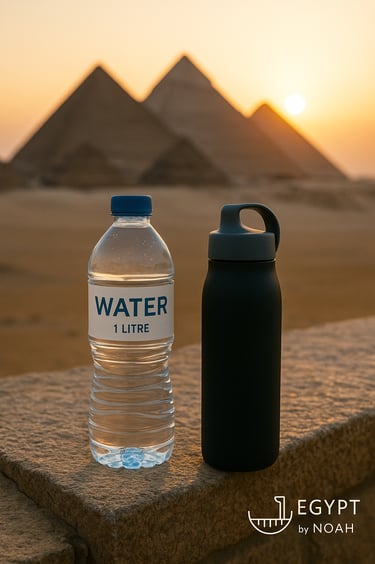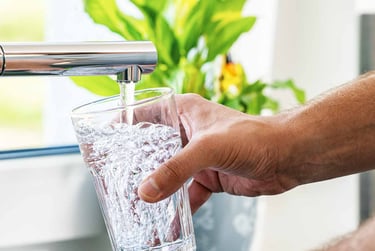Is Tap Water Drinkable in Egypt?
perfectly safe at the plant; unpredictable at the tap. (A practical guide from Egypt by Noah)
Mostafa Ahmed | The founder of Egypt by Noah
4/27/20252 min read


The one-sentence answer
Egypt’s tap water leaves the treatment plant safe, but by the time it travels through old pipes and rooftop tanks it may pick up bacteria. Drink sealed bottled water or use a proven filter flask; use tap water only for showering and (if you have a strong stomach) brushing teeth.
Why the tap water isn’t ideal for visitors?
Treatment is good, distribution is old.
Chlorination at the big plants in Cairo, Luxor and the Red-Sea resorts meets WHO standards, yet leaks in decades-old pipes allow micro-contamination.Rooftop storage tanks warm up.
Most buildings pump water to tanks on the roof to keep pressure steady. In Egypt’s sun those tanks heat quickly and can breed bacteria if not cleaned often.Locals are adapted, you are not.
Egyptians build gradual immunity to their local water. Visitors often develop traveller’s tummy from bacteria levels that barely affect residents.
Hotel bathrooms, ice and brushing teeth
Five-star chains usually run extra UV or reverse-osmosis filters. They still leave bottled water in rooms and suggest you drink that instead.
Three- and four-star properties: safe for showering; fine for brushing teeth if you don’t swallow, but bottled is better for children.
Restaurant ice: ask first. Large hotels and upscale restaurants use filtered water; street stalls often don’t.
Hot drinks: water is boiled for tea and coffee, so they’re safe everywhere.
Bottled water basics
Common brands: Nestlé Pure Life, Baraka, Aquafina, Hayah – all ISO-certified.
Cost: a 1.5-litre bottle costs about 10 EGP—roughly £0.25 / €0.30—in supermarkets or corner kiosks.
Where to buy: every mini-market, hotel shop, and tourist site. Save money by grabbing a six-pack on day one and keeping bottles in your hotel fridge.
Eco-friendly option: bring a sturdy filter flask (LifeStraw, Grayl). Refill from hotel gym coolers or tour-bus dispensers and cut your plastic use to near zero.
What happens if you drink the tap water?
Most travellers who take a few accidental gulps stay perfectly fine, but some develop mild diarrhoea and stomach cramps that can last 24–48 hours. Serious illness is rare. Carry oral rehydration salts, loperamide capsules, and contact a local pharmacy if symptoms persist beyond two days or include fever.
Five hydration tips for hassle-free touring
Aim for at least two litres of water a day; Egypt dehydrates you faster than you realise.
Keep a chilled bottle in your day-pack. Egypt by Noah drivers stock an icebox of spares for guests.
Use electrolyte powders after a long temple walk or desert quad-bike session.
Refill sustainably whenever you see a dispenser in hotels or cruise ships.
Skip raw salads or juices with unknown ice in budget eateries.
Quick FAQ
Can I wash fruit with tap water? Rinse with bottled water to be safe.
Contact lenses? Always use sterile solution, never tap water.
Is Nile-cruise water different? Ships load treated water in port but still advise bottled for drinking.
Can I boil tap water for baby formula? Better to use bottled or filtered water; boiling removes bacteria but not potential heavy-metal traces from pipes.
The takeaway
Tap water in Egypt is fine for locals and for showers, but bottled or filtered water keeps travellers healthier and trips smoother. Stock up cheaply, stay hydrated, and focus on the pyramids, not probiotics—your Egypt by Noah family has the rest covered.
(Sources: UK NHS Fit-for-Travel, CDC Yellow Book 2024, Lonely Planet Egypt 16th ed., Numbeo Cost-of-Living Index)

